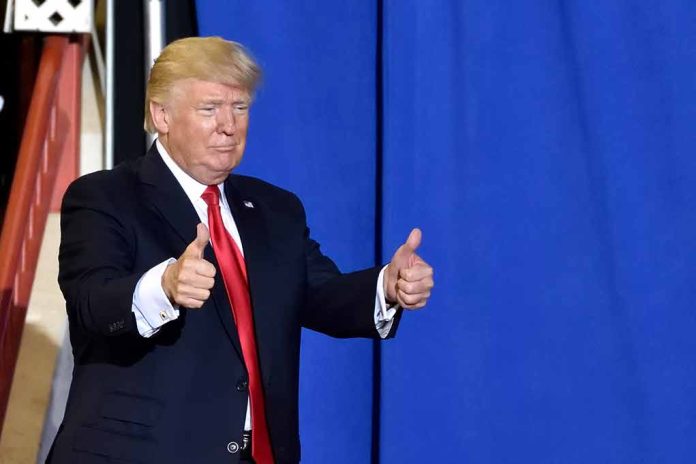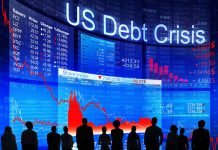
Former President Donald Trump’s proposal to cap credit card interest rates at 10% sparks debate and criticism from banking groups.
At a Glance
- Trump proposes 10% cap on annual credit card interest rates during Long Island rally
- Banking organizations swiftly oppose the plan, comparing it to Democrat price control measures
- Critics argue the cap could restrict credit access and push consumers towards riskier alternatives
- Trump’s proposal is part of his 2024 campaign’s populist economic agenda
Trump’s Populist Economic Proposal
Former President Donald Trump has ignited a firestorm of debate with his latest economic proposal. During a campaign stop on Long Island, Trump pledged to cap annual credit card interest rates at 10%, a move that has drawn both support and intense criticism. This proposal is part of Trump’s broader 2024 campaign strategy, which includes significant tax reductions and a populist economic agenda aimed at appealing to working-class Americans.
Trump argued that the cap would help working Americans, citing the current high average interest rates of 21.5% as of May. The former president’s proposal comes at a time when many Americans are struggling with credit card debt, especially in the face of rising inflation and economic uncertainty.
TRUMP SAYS HE WILL CAP CREDIT CARD INTEREST RATES AT 10%
— NewsWire (@NewsWire_US) September 19, 2024
Banking Industry Pushback
The banking industry has swiftly responded to Trump’s proposal with strong opposition. The Consumer Banking Association and other financial groups have criticized the plan, comparing it to price control measures previously advocated by Democrats, including Vice President Kamala Harris. These organizations argue that such a cap would have unintended consequences, potentially harming the very people it aims to help.
Critics warn that the proposed interest rate cap could lead to a significant reduction in credit card availability, particularly for low-income Americans. They argue that banks would be forced to restrict credit access to higher-income individuals who present lower risk, effectively shutting out many working-class borrowers from the credit market.
Historical Context and Potential Consequences
It’s worth noting that credit card interest rates have never been as low as 10% since the Federal Reserve’s dataset began in 1994. This historical context raises questions about the feasibility of Trump’s proposal and its potential impact on the financial industry. The American Bankers Association has expressed concern that such a drastic cap could push consumers towards riskier alternatives like payday lenders, which often charge even higher interest rates.
Trump’s proposal echoes similar initiatives from Democrats in recent years. In 2019, politicians like Bernie Sanders and Alexandria Ocasio-Cortez supported a 15% cap on credit card interest rates, which was also met with opposition from banking groups. The recurring nature of these proposals highlights the ongoing debate over consumer protection and financial regulation in the United States.
Broader Economic Implications
Beyond the credit card interest rate cap, Trump has made other bold economic promises as part of his campaign. He pledged to cut car insurance prices by half, further emphasizing his focus on reducing costs for American consumers. These proposals come at a time when the Federal Reserve has been actively managing interest rates, with Chairman Jerome Powell recently announcing a significant rate cut, reducing the Fed’s benchmark interest rate target by 50 basis points to a range between 4.75% and 5%.
As the 2024 presidential campaign continues to unfold, Trump’s economic strategies remain highly contentious. While supporters view these proposals as necessary steps to alleviate financial burdens on working Americans, critics argue they could have far-reaching negative consequences for the broader economy and financial system. The debate surrounding these economic policies is likely to intensify as the election draws nearer, with both sides presenting their cases to the American public.







